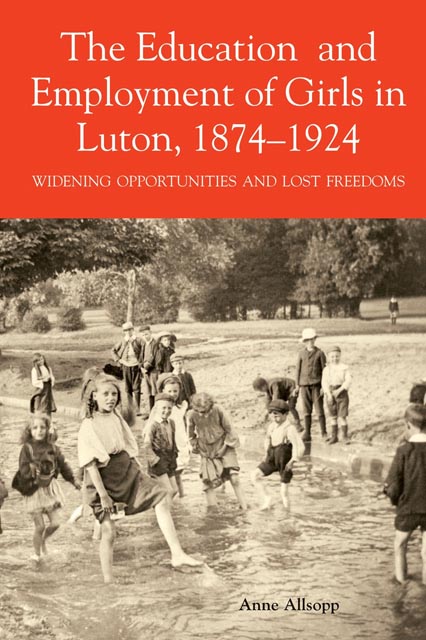Book contents
- Frontmatter
- Contents
- List of Illustrations
- List of Tables
- Dedication
- Acknowledgements
- Abbreviations
- Introduction
- Chapter One Luton: Scientiae et labori detur
- Chapter Two Further Perspectives Concerning Employment Patterns for Women
- Chapter Three Sunday Schools
- Chapter Four Education in the Time of the School Board
- Chapter Five Teaching: An Alternative Occupation
- Chapter Six Teacher Training and the Education of Students Aged Over Fourteen Under Bedfordshire County Council
- Chapter Seven Elementary Education 1903–1924
- Chapter Eight Rural Schools
- Chapter Nine Learning and Living
- Chapter Ten Secondary Education for Girls
- Conclusion
- Appendix
- Bibliography
- Index
Chapter Six - Teacher Training and the Education of Students Aged Over Fourteen Under Bedfordshire County Council
Published online by Cambridge University Press: 03 August 2023
- Frontmatter
- Contents
- List of Illustrations
- List of Tables
- Dedication
- Acknowledgements
- Abbreviations
- Introduction
- Chapter One Luton: Scientiae et labori detur
- Chapter Two Further Perspectives Concerning Employment Patterns for Women
- Chapter Three Sunday Schools
- Chapter Four Education in the Time of the School Board
- Chapter Five Teaching: An Alternative Occupation
- Chapter Six Teacher Training and the Education of Students Aged Over Fourteen Under Bedfordshire County Council
- Chapter Seven Elementary Education 1903–1924
- Chapter Eight Rural Schools
- Chapter Nine Learning and Living
- Chapter Ten Secondary Education for Girls
- Conclusion
- Appendix
- Bibliography
- Index
Summary
Luton had control over elementary education, but Bedfordshire County Council (BCC) was given responsibility for some other types of provision. The first of these was the setting up of technical training according to the requirements of the Technical Instruction Act of 1889. Some of these classes for women were connected with the straw hat industry, but others were decidedly domestic. They did, however, provide added opportunities for girls in the town to extend their horizons if they so wished.
The Balfour Education Act of 1902 compelled the Bedfordshire Education Committee (BEC) to make provision for the education of children over fourteen and resulted in the setting up of a day secondary school in Luton. Chapter Ten concentrates on this school, which played an important part in the development of girls’ education in Luton. Responsibility for the training of teachers was also transferred to the BEC and the pupil-teacher system was superseded by the appointment of student teachers. This change was not without its critics since the number of trainee teachers would be limited, all student teachers being required to have attended the secondary school. Training was provided for unqualified teachers who wished to become certificated and professional development was offered to serving teachers. These schemes were open to girls in Luton but no longer were opportunities relatively equal; education was becoming more selective.
Technical education
Towards the end of the nineteenth century there were concerns that England was falling behind some European countries in technical subjects and the Samuelson Commission (1882–1884) was asked to address the problem. As a result the Technical Instruction Act was passed in 1889. This gave county councils power to establish Technical Instruction Committees and raise a penny rate (one penny in the pound of rateable value) which could be used to pay for technical or manual instruction. The following year the Local Taxation (Customs and Excise) Act allowed money from the increased duty on beer and spirits to be spent by these committees. This became known as ‘whisky money’. Under the terms of this act teaching a trade was not allowed, but teaching ‘the principles of a trade’ was permitted.
- Type
- Chapter
- Information
- The Education and Employment of Girls in Luton, 1874-1924Widening Opportunities and Lost Freedoms, pp. 118 - 139Publisher: Boydell & BrewerFirst published in: 2023

